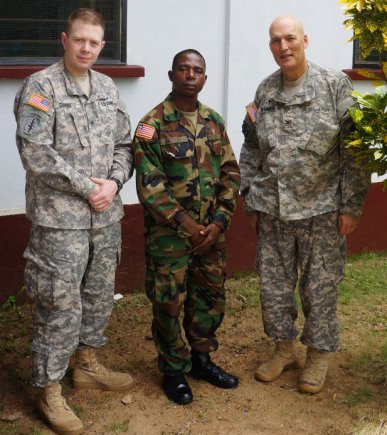By Jeff Brumley
Arm bumps instead of handshakes and twice-a-day temperature checks are among the steps taken by U.S. military personnel on the frontlines in the war against Ebola in Libera, says a U.S. Army chaplain endorsed by the Cooperative Baptist Fellowship.
Col. Charles Reynolds made the comments in an interview with a military news service which was republished today on the CBF’s blog site.
Reynolds is the senior chaplain for U.S. Army Africa, the military command supporting Operation United Assistance, the U.S. campaign to contain the outbreak of the Ebola virus.

Reynolds’ job is to minister to U.S. military and civilian personnel combating Ebola in Liberia. Following is a portion of Reynolds’ interview with the Army online publication.
Tell us about your mission in Liberia.
[U.S. Army Africa] is here to support the Joint Force Command/Armed Forces Liberia Operations assisting USAID, the CDC and the U.S. Embassy in constructing treatment centers, providing testing labs for victims and training health care workers to counter the Ebola virus in Liberia. We’re here to provide religious support to USAID and Embassy personnel, many of whom have experienced first-hand the trauma caused by the Ebola virus. In addition, we provide Title 10 religious support requirements to the Soldiers, Sailors, Airmen and Marines participating in Operation United Assistance.
What is the morale of our U.S. deployed personnel in Liberia?
Overall, morale is high. The risk to U.S. personnel is very low. We are very cautious, and wash our hands often. No one shakes hands or touches anyone. Instead, we bump arms. We are also checking our temperature twice a day. No one has direct contact with Ebola patients, so the risk of contracting Ebola is very low. Most soldiers are more concerned about family members who are worried about their safety. The greater danger to soldiers is malaria, or injuries from traffic accidents, since driving conditions are very different here.
How are you ministering and providing support?
Whether in Liberia or in a combat zone, it’s important to assure our soldiers, sailors and airman of God’s presence. I try to remind our personnel of the importance of what we are doing and how we’re offering hope to a nation that has been devastated. The importance of what we are doing is monumental for the Liberian people. We are making a difference in one of the largest epidemics of our lifetime. In three weeks, we have provided more logistical support to build treatment centers than all previous efforts combined. … God does not call chaplains and chaplain assistants to a life of safety; we are called to risk our lives to minister to those who need assurance of God’s presence.
How are our medical teams, soldiers, and staff making a difference on the ground there?
The other day I traveled to visit a site where a hospital is being built. There was a large crowd of Liberians who were standing near the construction site. You could see the hope in their faces as the purpose of the hospital was explained to them. Saturday, when I was riding back from doing worship services for the Seabees at the airport, it was one of the rare times that it was not raining. I had my window down and along the way several Liberians stopped and either waved or saluted me. It is common knowledge that the Liberians view the U.S. Army as a source of hope from this devastating disease.
Toni Kuma, a Liberian employee who attends our worship service at the embassy, said to me, “The arrival of the U.S. Army evaporated the thick cloud of fear and hopelessness that had engulfed the nation. The Army has given us hope and sunshine where there was none. The presence of men and women in uniform among us has restored our hope of living again. Sending funding to help fight the virus was important, but sending the troops at the time when the whole world seemed to have abandoned the nation, is very much appreciated. Your presence, your faith and your success is our hope. God bless you.”
